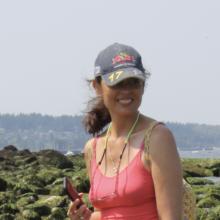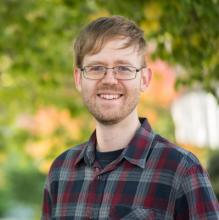PSI Scholar Natasha Orr became interested in female reproductive health while she was an undergraduate student at Queen’s University. During a volunteer trip to Ghana, she observed a baby being born naturally for the first time.
“It was hot. There were no windows to open, no air conditioning, and only a small fan on the ceiling that had a single blade left, and that spun so slowly. I should have been miserable, but I wasn’t. As I stood in anticipation, the dead silence of the room was shattered by the cry of a new born baby. This was the most incredible thing I had ever seen, and I knew at that moment, that my life’s journey would be to become a clinician-scientist, primarily helping mothers in their health.”
While pursuing her masters in Reproductive and Developmental Sciences at UBC, she began to work at Endometriosis and Pelvic Pain Lab. Learning that endometriosis affects 10% of women and that these women often struggle just to get medical professionals to believe that their menstrual and sexual pain is real inspired Natasha to continue pursuing this field with my doctoral research to help women with sexual pain.
Today her graduate research focuses on the role of the central nervous system and genetics in endometriosis-associated sexual pain.She is currently looking at how to phenotype patients based on their primary cause of sexual pain, in order to provide a framework for treatment. This will help reduce unnecessary treatment and hopefully alleviate sexual pain in women with endometriosis.
As a UBC Public Scholar, Natasha is leading a project to create 3D animated videos on endometriosis and the causes of sexual pain. She wants to provide patients with accessible materials to support informed decision-making about their care. “I hope that my research will be able to define a framework for the treatment of sexual pain in women with endometriosis to provide the most accurate treatment plan.”
Research Description
Endometriosis is a gynaecologic condition that affects 10% of women, and 50% of those women have deep dyspareunia (pelvic pain with deep penetration during sexual activity). This pain negatively affects sexual function and relationships. Factors that play a role in deep dyspareunia may be peripheral (e.g., location of endometriotic nodules) and/or central (e.g., pathological sensitization at the level of the brain and spinal cord). As a doctoral student, I am leading two studies: one to validate the role of somatic mutations in endometriosis deep dyspareunia, and a second to assess the relationship between central sensitization (amplification of pain) and deep dyspareunia in women with endometriosis using a prospective longitudinal design. Bridging together my research findings on the multifactorial causes of sexual pain with integrated knowledge translation techniques, I will be able to engage our patients, and our research team to create animated videos to educate women on these findings. The videos will translate up-to-date information about potential causes of sexual pain to patients and their partners.
What does being a Public Scholar mean to you?
Being a public scholar means that my research findings contribute positively to the community. Our team is very fortunate to have an extremely enthusiastic Research Patient Advisory Board who will work with me on this project to ensure the study findings are meaningful to patients and that the results are disseminated in an accessible way. Additionally, being a scholar means that I will have incredible opportunities for professional development.
In what ways do you think the PhD experience can be re-imagined with the Public Scholars Initiative?
The Public Scholars Initiative brings to the PhD experience the ability to contribute directly to public good. The Initiative provides a network of scholars from all disciplines who may be experiencing similar challenges within their degree but who you may otherwise not have met. The Initiative also brings a creative edge to a typically academic focused experience – thanks to PSI funding I will have the opportunity to create animated videos to educate women about our research findings. This is a unique opportunity that I would not have gotten without this organization, since typical translation of my research findings would have been done through academic publications.
How do you envision connecting your PhD work with broader career possibilities?
Working with an interdisciplinary team of researchers, knowledge users, and private sector animators will provide me with the insight and skills needed to ensure that the research I generate in the future will translate into meaningful results. Managing a team will also equip me with the skills I need to lead larger projects in my career. Specifically, I will gain the ability to assemble team members with a combination of skills, develop a strategy for team members to reach a project goal, assign tasks to team members, and monitor progress to ensure timely project completion. These skills are central to success in any professional setting and are typically underemphasized in graduate education.
How does your research engage with the larger community and social partners?
My project will involve patient collaborators from beginning to end who will help guide the videos to ensure they are meaningful to patients. We will disseminate these videos to the community through social media and our center's website.
Why did you decide to pursue a graduate degree?
My experiences before my graduate degree involved international volunteerism where I developed a passion for obstetrics and gynecology, and four years in a neuroanatomy laboratory during my undergraduate degree which sparked an interest in research. After doing research on somatic mutations in endometriosis lesions and central mechanisms in endometriosis-associated sexual pain during my Master’s degree, I felt drawn to continue with a PhD degree so that I could explore these phenomena. Additionally, the opportunity for teaching during my graduate studies was too great to pass up!
Why did you choose to come to British Columbia and study at UBC?
I chose to pursue graduate research in UBC’s Reproductive and Developmental Sciences program for many reasons. Firstly, this program offers the opportunity to work in clinical and biological research. Secondly, UBC provides multiple professional development and educational experiences for graduate students, including publishing and statistical workshops. UBC also provides multiple funding opportunities. Additionally, choosing UBC had a lot to do with my supervisors and the environment I would be in. Working under the supervision of incredibly supportive experts in the field, as well as at a specialized centre for endometriosis and pelvic pain has made my graduate degree exceptional. Not only does UBC have an incredible educational program, but BC offers many opportunities for beautiful outdoor adventures.
Being a public scholar means that my research findings contribute positively to the community ... to ensure the study findings are meaningful to patients and that the results are disseminated in an accessible way.




